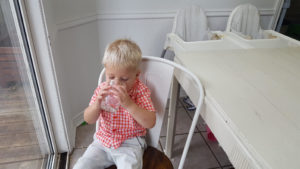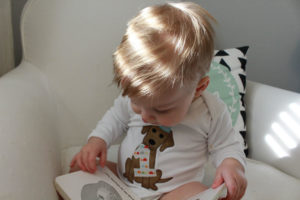As a collective of mothers, we march to the drum of our children’s voices. Their melody gently pushes us onward through the monotony, striking a resounding spark from the first word. The power in their sounds moves us to action, to laughter, to tears. This newfound language is a tool that decreases frustration and enriches shared experiences. How could we not want to give it a boost from the very beginning? Today I want to share with you a culmination of practices that I have gleaned both as a clinician of speech language pathology and simply as a mother myself. First, a few ground rules:
- Recognize there is a wide range of normal. It is alluring to compare your child to others and (secretly) exhilarating when they beat a cohort to a milestone, but please remember mama, when they are on the slow end of normal it is OKAY and you will both BE okay!
- No baby talk. Yes, infant babbling is adorable and a two-year-old saying “wabbit” or “tookie” is cute, and should never be shamed or made fun of, but should also not be repeated. If our wish is for our children to speak clearly the best way to help is to speak clearly to them.
More Than Words
So much communication takes place without words. Because of the complexity of muscle development and movements speech requires, your child will understand what you are saying long before they have the aptitude to articulate a response. They will clap, wave and point before they form a word you can understand. If your child is not talking yet, focus on these other forms of communication. Ask them to point to what they want. Learn a few words in sign language like “more” and “finished” and try teaching them to your child at meal times. Play peek-a-boo and laugh together. Practice making faces that reflect how you are feeling while naming those feelings for your child. Chances are you will both have a lot of fun and believe it or not you are giving your child’s language a huge boost in the process!
Sips & Bites for Speech 
Each meal time holds a chance to polish the clarity of your child’s speech! All that patience you give to carefully spoon-feeding purees is actually strengthening and coordinating their lips for numerous speech sounds. Moving forward, don’t be afraid to let your child try different textures and bite into things like apples, corn on the cob or a chicken leg. By opening their jaw wide, biting down and chewing they are actually exercising and strengthening their jaw which plays a big role in speech. Also consider switching out their sippy cup for a straw cup. Sucking from a straw engages more muscles and makes the tongue pull backward, strengthening it for the tricky /R/ sound. Find a place that’s mess friendly and let your little practice drinking out of a regular open cup. Doing this will help them master holding their jaw stable in an open position, which is a key for clear speech!
Talking With Your Child: The Art of Conversation
 Even before your child starts saying words, practice taking turns when you talk with them. Ask them questions and pause for a response. Make eye contact. When they get older ask open-ended questions, not just questions that can be answered with yes or no. These may seem like small details, but they are significant. These practices activate and challenge the language areas of your child’s brain, giving its development a mega boost!
Even before your child starts saying words, practice taking turns when you talk with them. Ask them questions and pause for a response. Make eye contact. When they get older ask open-ended questions, not just questions that can be answered with yes or no. These may seem like small details, but they are significant. These practices activate and challenge the language areas of your child’s brain, giving its development a mega boost!
Read, Read, Read & Sing, Sing, Sing
 Reading is considered a language skill. While mastery may be many years away, the language centers in child’s brain are firing away as your child sits in your lap to look at pictures while listening to your voice. Reading and especially rereading the same books over and over helps your child learn new words. I read my son “Goodnight Moon” almost every night before bed his first year of life and his first word ended up being “moon” while pointing to the moon in that book. Singing holds speech and language benefits as well. Many children’s songs have clapping and motions that boost non-verbal communication and the song’s repetitive natures help them practice articulating the same sounds over and over. Plus, singing is fun and fun helps learning stick!
Reading is considered a language skill. While mastery may be many years away, the language centers in child’s brain are firing away as your child sits in your lap to look at pictures while listening to your voice. Reading and especially rereading the same books over and over helps your child learn new words. I read my son “Goodnight Moon” almost every night before bed his first year of life and his first word ended up being “moon” while pointing to the moon in that book. Singing holds speech and language benefits as well. Many children’s songs have clapping and motions that boost non-verbal communication and the song’s repetitive natures help them practice articulating the same sounds over and over. Plus, singing is fun and fun helps learning stick!
When to be Concerned
Familiarize yourself with normal speech language development in children. To save you a little time wading through google search results, this is an excellent resource: https://www.asha.org/public/speech/development/chart/. Many speech errors are normal for toddlers, such as saying difficult sounds unintelligibly, substituting sounds or omitting a sound altogether. Generally most children say their first word around the age of one year, are putting two words together and saying around 50 different words by age two and should be at least 75% intelligible by age three. Never hesitate to discuss your child’s speech with your pediatrician if you have a concern. Typically the earlier a problem is identified, the easier it is to correct.
Now go enjoy a nice little chit chat with those precious babies of yours!













